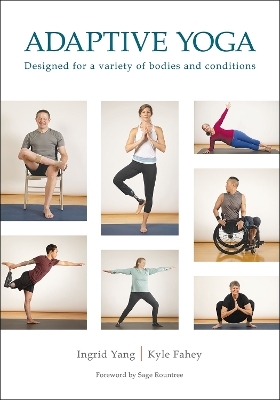
Adaptive Yoga
Human Kinetics (Verlag)
978-1-4925-9664-6 (ISBN)
The massive growth in the popularity of yoga as a form of exercise and as a method of maintaining whole-body wellness has led to thousands of published research studies confirming what yoga practitioners already know: Yoga relieves stress, improves mental and emotional health, enhances sleep, relieves low back pain and neck pain, promotes weight loss, and even enables smoking cessation. Further study has proven that yoga helps individuals with disabilities improve their functional activities of daily living, recover from injuries, gain mobility, experience less pain, and manage anxiety and depressive symptoms.
Adaptive Yoga takes these studies out of the research labs and onto the yoga mat to empower individuals with disabilities or chronic health conditions to create an effective and safe yoga practice. If you work with these special populations as a yoga teacher or rehabilitative therapist, you will find guidance and recommended poses for some of the most common conditions and disabilities, including these:
Low back pain
Hip, knee, and rheumatoid arthritis
Spinal cord injury
Stroke
Cerebral palsy
Lower limb amputation
Parkinson’s disease
Multiple sclerosis
Each pose is presented in detail so you fully understand how it helps the student improve functionality. The text instructs the reader on how to enter, hold, and exit the pose safely, as well as why the pose is beneficial for that condition. When appropriate, contraindications are presented so the yoga practice can be tailored to address any additional conditions or limitations. Challenge variations and restorative modifications for many poses make further individualization possible.
In Adaptive Yoga, authors Ingrid Yang, MD, and Kyle Fahey, DPT, have combined their extensive backgrounds in yoga, medicine, and physical therapy with their unique insights and passion for movement and rehabilitation to present an essential guide for helping those with chronic conditions experience the countless physical and mental benefits of yoga practice.
Ingrid Yang, MD, JD, E-RYT 500, C-IAYT, is a deeply knowledgeable, creative, and inspiring yoga therapist, teacher, and physician. She earned her doctorate of medicine from Rush Medical College in Chicago, Illinois. She then received postgraduate residency training at Northwestern’s Feinberg School of Medicine, where she specialized in physical medicine and rehabilitation, completing a year of inpatient rehabilitation medicine training. Dr. Yang subsequently completed an internal medicine residency at Scripps Green Hospital in San Diego, California. She was awarded her juris doctorate at Duke University School of Law and received her bachelor of arts in economics at Barnard College in New York City. Her first book, Hatha Yoga Asanas: A Pocket Guide to Personal Practice, was published by Human Kinetics in 2011. Dr. Yang leads teacher trainings, workshops, and retreats all over the world. She seeks to integrate her background in allopathic medicine with the ancient teachings of the centuries-old yoga traditions. Her teaching is seeded deeply in dharmic philosophies and an expert grasp of movement kinesiology. Her special focus on the physiology of healing through breath work, meditation, and mind–body connection brings a unique and joyful perspective to the practice and study of yoga. Prior to her current work, Dr. Yang was an intellectual property attorney; founded and owned Blue Point Yoga Center in Durham, North Carolina; and entertained audiences as a jazz singer in Australia. Kyle Fahey, DPT, PT, is a doctor of physical therapy and senior physical therapist at the Shirley Ryan AbilityLab in Chicago, Illinois, the world’s largest and top-ranked acute rehabilitation hospital. As a graduate of Northwestern University’s doctor of physical therapy program, Dr. Fahey is an expert in biomechanics and rehabilitation for those with severe disabilities in all levels of rehab. He develops programs for his patients to regain and preserve strength, endurance, and balance following debilitating injury or illness. In 2017, Dr. Fahey was made Shirley Ryan’s pain management physical therapy director and specialist. In this role, he formulates pain-specific interventions and consultations to individuals with a wide variety of medical diagnoses throughout the hospital. He is the founder and creator of a weekly wheelchair yoga program for the hospital and seamlessly integrates adaptive yoga into his treatments. Dr. Fahey is also the chairman of the Telehealth and Technology in Practice Committee of the Illinois Physical Therapy Association and serves as an active member of the American Physical Therapy Association. As a leader in the physical therapy telehealth initiative, he strives to improve access to physical therapy care and believes that everyone can benefit from rehab.
Part I. Principles of Adapting Yoga
Chapter 1. Yoga as Rehabilitation
Chapter 2. How the Body Moves
Part II. Adapting Yoga for Specific Disabilities
Chapter 3. Low Back Pain
Chapter 4. Osteoarthritis of the Hip and Knee
Chapter 5. Rheumatoid Arthritis
Chapter 6. Lower Limb Amputation
Chapter 7. Spinal Cord Injury
Chapter 8. Parkinson’s Disease
Chapter 9. Stroke
Chapter 10. Multiple Sclerosis
Chapter 11. Cerebral Palsy
| Erscheinungsdatum | 12.11.2020 |
|---|---|
| Vorwort | Sage Rountree |
| Verlagsort | Champaign, IL |
| Sprache | englisch |
| Gewicht | 885 g |
| Themenwelt | Sachbuch/Ratgeber ► Gesundheit / Leben / Psychologie |
| Sachbuch/Ratgeber ► Sport ► Fitness / Aerobic / Bodybuilding | |
| Medizin / Pharmazie ► Physiotherapie / Ergotherapie ► Rehabilitation | |
| ISBN-10 | 1-4925-9664-7 / 1492596647 |
| ISBN-13 | 978-1-4925-9664-6 / 9781492596646 |
| Zustand | Neuware |
| Informationen gemäß Produktsicherheitsverordnung (GPSR) | |
| Haben Sie eine Frage zum Produkt? |
aus dem Bereich


